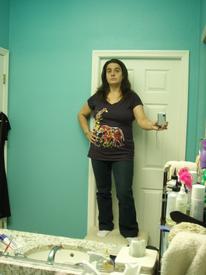Is this myth about eating late at night true....

balancedbrunette
Posts: 530 Member
What are people's thoughts on this?..Just wondering I was at my friends yesterday who is not really weight conciouss but she's always prone to eating late in the evening, now I know some people have to depending on their work and everything but is it effectively bad in the long run if you do sit down round 9 o'clock and have a bit of toast and tea....would I be better off without it?
what are people's opinions on this?
what are people's opinions on this?
0
Replies
-
Given equal calorie intakes in both scenarios it is entirely false.0
-
I munch at night and have been doing so the entire time. I have lost 87 pounds so it has not affected me.0
-
There are tons of people who will tell you it isn't true. There are people who say there's a chemical process that starts late at night and that you could affect your weight loss.
I would say that you won't find tons of people coming out and saying one or the other only because this has been a battle in the past over whose right.
I say - do what's right for you - don't eat over your calories and you should still lose weight. I suspect a tea and slice of bread won't hurt anyone that badly. The big part is eating the amount of calories you need, eating right and not giving up and always documenting what you're really eating. You have to be truthful about that or you're just destroying any chance you have of losing weight.0 -
I've been a trainer for 11 years. Weightloss is basic math. Eat whenever you want. Evenly space your calories for the sake of your energy level. Nighttime eating is not negative. Just don't let the bulk of your calories land there.0
-
I think that you can eat whenever you want, as long as you stick to your calorie goals for the day, and still lose weight.
 0
0 -
I typically have my 800-1000+ calorie dinner around 7-8pm, then a glass of chocolate milk at bedtime about two hours later. Never hurt my progress.0
-
i have popcorn and a vita cake or 1/2 bagel every night at 9:30 pm and try to get to bed by midnight -- as of yesterday lost 28 lbs. I'm calling BS on that theory.
that being said -- I would tend to agree it's probably better on your digestive system to stop eating maybe 2 hours before bed..but I don't think it has anything to do with stalling weight loss. JMO0 -
I think that a calorie is still a calorie no matter what time you eat it, and should be treated that way
 0
0 -
I don't normally have my evening meal until 8-8.30pm and haven't found any negative effects from it so far!0
-
I'm another late night eater. Only way I can fit in 2 hour gym work outs and a full time job.0
-
I do most of my eating at night so it is NOT true at all!!!!0
-
I have one golden rule for my clients when it comes to eating late... Do not eat starchy or sugary carbs. Only lean sources of protein and veggies should be eaten late in the day if fat burning is the goal. Another rule of thumb... If you're awake, you should be eating every 3 hrs, including late night, right up until the minute you go to bed. So eat away.0
-
I don't eat late at night because when I do, I wake up in the morning feeling really bloated, and it makes me feel that I'm not looking after my food intake properly. But I'm sure that even if I eat late yet keep to my daily calorie goal, after a week I will still have lost the projected amount of weight expected anyway. I suppose also that people who eat late a night may do so from cravings (unless this is just a routine meal), and so every evening they're just piling on extra calories causing them to put on weight over time... perhaps that's where the myth comes from.0
-
I have one golden rule for my clients when it comes to eating late... Do not eat starchy or sugary carbs. Only lean sources of protein and veggies should be eaten late in the day if fat burning is the goal. Another rule of thumb... If you're awake, you should be eating every 3 hrs, including late night, right up until the minute you go to bed. So eat away.
What's the rationale behind that?0 -
I try to eat my main meal before 6:00. Sometimes I don't succeed, though... and it's more like 8:00. However, I almost always have a late night snack of peanut butter and milk. It does not seem that it has not effected my weight loss one bit.0
-
I think that a calorie is still a calorie no matter what time you eat it, and should be treated that way

Good point, Jen. :happy:0 -
To go into a bit of detail about this idea:
Change in fat stores is the difference between acute fat storage and acute fat oxidation. You're essentially going through periods of fat storage and fat oxidation and the difference between the two determines how much fat you gain or lose. If fat oxidation exceeds fat storage, you lose fat. If fat storage exceeds fat oxidation, you gain fat. Looking at this net difference over the course of several weeks or months is what matters. Looking at what happens overnight, or during a few hours, is very misleading and often results in people making decisions for themselves or their clients that simply isn't necessary.
As it pertains to eating during the day or night, looking at the endpoints for purposes example:
Suppose you eat all your calories during the day and lets further suppose that most of your intake is in the AM and none of it at night. In this example, you are blunting fat oxidation during the day and increasing fat storage during the day. You eat nothing before bed so fat storage goes down and fat oxidation goes up.
Suppose you eat all of your calories at night: Fat storage goes up while you sleep because you've got a gut full of food. Fat oxidation drops. However, during the day (prior to you eating all your food at night) fat oxidation goes up (you're fasted) and fat storage goes down.
The differences in fat loss or fat storage between these two scenarios will be dictated by energy balance (calories in vs calories out).
I would suggest that people choose whatever method gives them the best:
1) Dietary adherence (personal preference)
2) Gym performance
The above two factors matter a GREAT deal.
But the other stuff, like "Oh no I'm eating a carb and then not burning off, I'll get fat!" is complete nonsense and you should ignore it.0 -
I have been a personal trainer and in the fitness field for over 30 years in addition to having a degree in the field. With that being said, when someone tells me that they don't eat past 6 pm, I don't buy it. Calories in have to be equal to calories out no matter what time you eat them.
The problem with consuming them all at night is that you don't have time to use them and take advantage of them. You go throughout the day without any energy (you may feel like you have it but you could have more if you ate during the day) . Also, if you eat too many calories at once, then your body stores more as fat as it cannot handle digesting all of those calories at once.
Finally, small meals spread throughout the day keep your metabolic rate going. If you eat the majority at night and little during the day, over time your body feels that it is in starvation mode. Hence, your metabolic rate lowers to conserve food energy that you do have in your body.
Respectfully submitted,
Ellen Yates0 -
To go into a bit of detail about this idea:
Change in fat stores is the difference between acute fat storage and acute fat oxidation. You're essentially going through periods of fat storage and fat oxidation and the difference between the two determines how much fat you gain or lose. If fat oxidation exceeds fat storage, you lose fat. If fat storage exceeds fat oxidation, you gain fat. Looking at this net difference over the course of several weeks or months is what matters. Looking at what happens overnight, or during a few hours, is very misleading and often results in people making decisions for themselves or their clients that simply isn't necessary.
As it pertains to eating during the day or night, looking at the endpoints for purposes example:
Suppose you eat all your calories during the day and lets further suppose that most of your intake is in the AM and none of it at night. In this example, you are blunting fat oxidation during the day and increasing fat storage during the day. You eat nothing before bed so fat storage goes down and fat oxidation goes up.
Suppose you eat all of your calories at night: Fat storage goes up while you sleep because you've got a gut full of food. Fat oxidation drops. However, during the day (prior to you eating all your food at night) fat oxidation goes up (you're fasted) and fat storage goes down.
The differences in fat loss or fat storage between these two scenarios will be dictated by energy balance (calories in vs calories out).
I would suggest that people choose whatever method gives them the best:
1) Dietary adherence (personal preference)
2) Gym performance
The above two factors matter a GREAT deal.
But the other stuff, like "Oh no I'm eating a carb and then not burning off, I'll get fat!" is complete nonsense and you should ignore it.
Wow. Thanks for the info!0 -
I probably eat a 3-400 calorie "snack" every night about a half hour before bed- Yeah, I'm really holding onto that belly fat!! =/
Myth. Pre-bedtime snacks are the greatest. 0
0 -
I have been a personal trainer and in the fitness field for over 30 years in addition to having a degree in the field. With that being said, when someone tells me that they don't eat past 6 pm, I don't buy it. Calories in have to be equal to calories out no matter what time you eat them.
The problem with consuming them all at night is that you don't have time to use them and take advantage of them. You go throughout the day without any energy (you may feel like you have it but you could have more if you ate during the day) . Also, if you eat too many calories at once, then your body stores more as fat as it cannot handle digesting all of those calories at once.
Finally, small meals spread throughout the day keep your metabolic rate going. If you eat the majority at night and little during the day, over time your body feels that it is in starvation mode. Hence, your metabolic rate lowers to conserve food energy that you do have in your body.
Respectfully submitted,
Ellen Yates
ellen@n2shape.com
N2SHAPE, Inc.
n2shape.com
You may benefit from the below research on meal frequency. Diet induced thermogenesis is not frequency based.
http://www.bodyrecomposition.com/research-review/meal-frequency-and-energy-balance-research-review.html
http://body-improvements.com/resources/eat/#frequency
http://www.ncbi.nlm.nih.gov/pubmed/9155494
http://www.leangains.com/2010/10/top-ten-fasting-myths-debunked.html0 -
I have one golden rule for my clients when it comes to eating late... Do not eat starchy or sugary carbs. Only lean sources of protein and veggies should be eaten late in the day if fat burning is the goal. Another rule of thumb... If you're awake, you should be eating every 3 hrs, including late night, right up until the minute you go to bed. So eat away.
You couldn't be any more wrong.0 -
I have been a personal trainer and in the fitness field for over 30 years in addition to having a degree in the field. With that being said, when someone tells me that they don't eat past 6 pm, I don't buy it. Calories in have to be equal to calories out no matter what time you eat them.
The problem with consuming them all at night is that you don't have time to use them and take advantage of them. You go throughout the day without any energy (you may feel like you have it but you could have more if you ate during the day) . Also, if you eat too many calories at once, then your body stores more as fat as it cannot handle digesting all of those calories at once.
Finally, small meals spread throughout the day keep your metabolic rate going. If you eat the majority at night and little during the day, over time your body feels that it is in starvation mode. Hence, your metabolic rate lowers to conserve food energy that you do have in your body.
Respectfully submitted,
Ellen Yates
ellen@n2shape.com
N2SHAPE, Inc.
n2shape.com
You may benefit from the below research on meal frequency. Diet induced thermogenesis is not frequency based.
http://www.bodyrecomposition.com/research-review/meal-frequency-and-energy-balance-research-review.html
http://body-improvements.com/resources/eat/#frequency
http://www.ncbi.nlm.nih.gov/pubmed/9155494
http://www.leangains.com/2010/10/top-ten-fasting-myths-debunked.html
Thanks Sidesteel. Trumping bro science with actual science!0 -
I don't eat two hours before going to bed because if I do I wake up in the morning with a super foul disgusting taste in my mouth. It's disgusting...but it's the only reason.0
-
Given equal calorie intakes in both scenarios it is entirely false.
^This.
I eat almost all my calories at night.0 -
I have been a personal trainer and in the fitness field for over 30 years in addition to having a degree in the field. With that being said, when someone tells me that they don't eat past 6 pm, I don't buy it. Calories in have to be equal to calories out no matter what time you eat them.
The problem with consuming them all at night is that you don't have time to use them and take advantage of them. You go throughout the day without any energy (you may feel like you have it but you could have more if you ate during the day) . Also, if you eat too many calories at once, then your body stores more as fat as it cannot handle digesting all of those calories at once.
Finally, small meals spread throughout the day keep your metabolic rate going. If you eat the majority at night and little during the day, over time your body feels that it is in starvation mode. Hence, your metabolic rate lowers to conserve food energy that you do have in your body.
Respectfully submitted,
Ellen Yates
ellen@n2shape.com
N2SHAPE, Inc.
n2shape.com
have you studied nutrition?0 -
I have one golden rule for my clients when it comes to eating late... Do not eat starchy or sugary carbs. Only lean sources of protein and veggies should be eaten late in the day if fat burning is the goal. Another rule of thumb... If you're awake, you should be eating every 3 hrs, including late night, right up until the minute you go to bed. So eat away.
Why?0 -
Finally, small meals spread throughout the day keep your metabolic rate going. If you eat the majority at night and little during the day, over time your body feels that it is in starvation mode. Hence, your metabolic rate lowers to conserve food energy that you do have in your body.
Respectfully submitted,
Ellen Yates
ellen@n2shape.com
N2SHAPE, Inc.
n2shape.com
yeah,,,, no.0 -
I have been a personal trainer and in the fitness field for over 30 years in addition to having a degree in the field. With that being said, when someone tells me that they don't eat past 6 pm, I don't buy it. Calories in have to be equal to calories out no matter what time you eat them.
The problem with consuming them all at night is that you don't have time to use them and take advantage of them. You go throughout the day without any energy (you may feel like you have it but you could have more if you ate during the day) . Also, if you eat too many calories at once, then your body stores more as fat as it cannot handle digesting all of those calories at once.
Finally, small meals spread throughout the day keep your metabolic rate going. If you eat the majority at night and little during the day, over time your body feels that it is in starvation mode. Hence, your metabolic rate lowers to conserve food energy that you do have in your body.
Respectfully submitted,
Ellen Yates
ellen@n2shape.com
N2SHAPE, Inc.
n2shape.com
This is just wrong.
Also, personal trainers generally have very little education in nutrition. Did you study nutrition at all?0 -
I have been a personal trainer and in the fitness field for over 30 years in addition to having a degree in the field. With that being said, when someone tells me that they don't eat past 6 pm, I don't buy it. Calories in have to be equal to calories out no matter what time you eat them.
The problem with consuming them all at night is that you don't have time to use them and take advantage of them. You go throughout the day without any energy (you may feel like you have it but you could have more if you ate during the day) . Also, if you eat too many calories at once, then your body stores more as fat as it cannot handle digesting all of those calories at once.
Finally, small meals spread throughout the day keep your metabolic rate going. If you eat the majority at night and little during the day, over time your body feels that it is in starvation mode. Hence, your metabolic rate lowers to conserve food energy that you do have in your body.
Respectfully submitted,
Ellen Yates
ellen@n2shape.com
N2SHAPE, Inc.
n2shape.com
Did you had a tall glass of brotein with that bro-science, bro?0
This discussion has been closed.
Categories
- All Categories
- 1.4M Health, Wellness and Goals
- 398.2K Introduce Yourself
- 44.7K Getting Started
- 261K Health and Weight Loss
- 176.4K Food and Nutrition
- 47.7K Recipes
- 233K Fitness and Exercise
- 462 Sleep, Mindfulness and Overall Wellness
- 6.5K Goal: Maintaining Weight
- 8.7K Goal: Gaining Weight and Body Building
- 153.5K Motivation and Support
- 8.4K Challenges
- 1.4K Debate Club
- 96.5K Chit-Chat
- 2.6K Fun and Games
- 4.8K MyFitnessPal Information
- 12 News and Announcements
- 21 MyFitnessPal Academy
- 1.5K Feature Suggestions and Ideas
- 3.2K MyFitnessPal Tech Support Questions
















